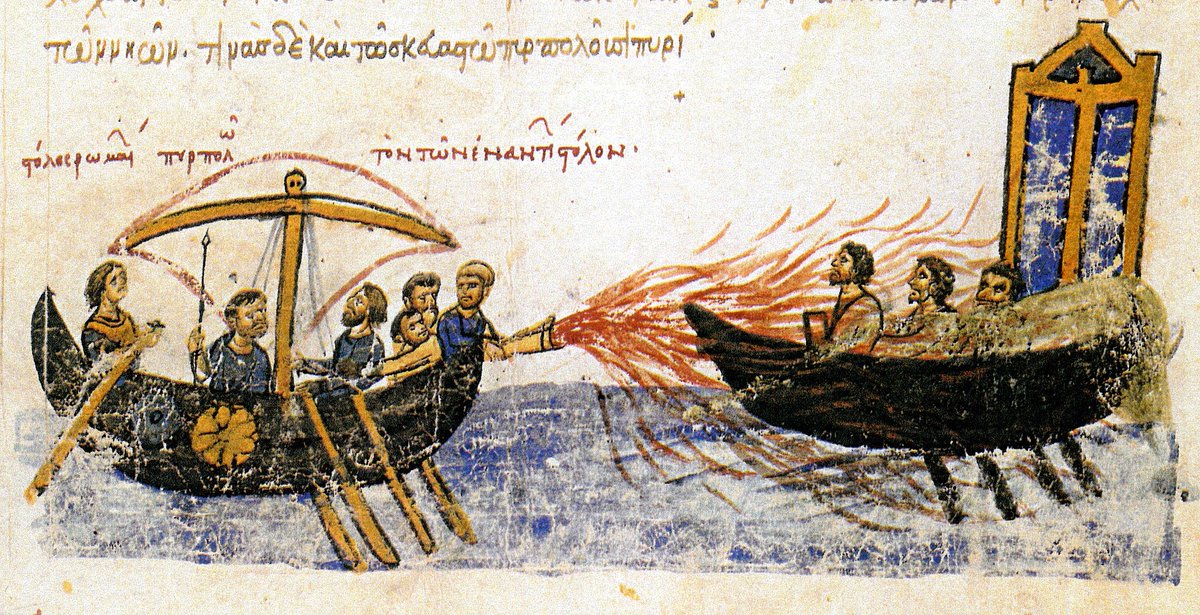Many people talk about the geopolitics of oil, but not enough about the critical role oil played in the politics of the Middle East 1,300 years ago. Oil was a key ingredient of Greek Fire, which enabled Byzantium to hold out against the Arab Conquests in the 7th & 8th centuries
Sieges of Constantinople in 669 and 718 were pushed back when Byzantine ships used Greek Fire against the Arab fleets, to devastating effect
The recipe for "liquid fire" - as Greek speakers such as the Byzantines knew it - was known only to a few engineers and to the Imperial family. It has been lost to history. But it seems likely to have included crude oil, sulphur, and possibly lime and pine resin
Oil supplies could have been sourced from a several places within or on the borders of the Byzantine empire, including territories in what is now southern Russia, Azerbaijan, Syria or Iraq
There even seems to have been some primitive refining involved. The crude was heated to separate the lighter fractions, which were then sprayed at enemies through iron tubes, using a pump called a siphon
There was probably a lighted fuse at the end of the tube to act as an igniter, the way you would have an igniter on a flare stack or a flamethrower
Anna Komnene, the Byzantine princess and historian, has a vivid account of liquid fire being used against the Pisan fleet during the First Crusade:
"The barbarians became thoroughly alarmed because of the fire directed upon them. For they were not accustomed to those machines, or to a fire, which naturally flames upwards, but in this case was directed in whatever direction the sender desired, often downwards or laterally"
The secret of liquid fire was well kept. The emperor Constantine VII wrote to his son: "He who should dare give of this fire to another nation should neither be called a Christian, nor be held worthy of any rank or office...
...and if he should be the holder of any such, he should be expelled therefrom and be anathematized and made an example for ever and ever, whether he were an emperor, or patriarch, or any other man whatever, either ruler or subject"
Constantine VII also left instructions on where to find the crude to make liquid fire: in southern Russia, east of the Crimea. He also gave details of how to bring it to Byzantium while bypassing hostile Bulgaria. The world& #39;s first strategically significant oil supply route?
As @anasalhajji says, the Arabs had their own Greek Fire troops, known as "naffatin", from "naft" meaning oil. It was used by the Turks in the successful defence of Tyre against Baldwin 1 in 1112, and by the Egyptians to destroy the fleet of Louis IX in the 7th Crusade in 1250
Greek Fire fell out of use by the Byzantine forces, for reasons that remain unclear. It was not an easy weapon to use. Anna Komnene notes that in the battle against the Pisan fleet, Great Duke Landulph, who led the Byzantine navy...
..."drew close to the Pisan ships and threw fire at them, but aimed badly, and thus accomplished nothing but wasting his fire."
From the late 12th Century, the Byzantine navy went into decline, and with it the use of Greek Fire. There was one last flicker. In the siege of Constantinople by the Ottomans in 1453, the defenders used it to clear the tunnels that Mehmed II& #39;s troops were digging under the walls
In the end though, Greek Fire played only a marginal role in the siege. Constantinople fell because of the Turkish engineers, helped by the Hungarian mercenary Orban, who built 200 giant cannons that destroyed a vulnerable section of the city& #39;s walls, opening it up for an assault
The first Oil Age was over. You could call it an energy transition
Sources include & #39;Greek Fire and its contribution to Byzantine might: An Introduction to a terrifying weapon& #39; by Konstantinos Karatolios: https://www.amazon.com/Greek-Fire-contribution-Byzantine-might-ebook/dp/B00IBNVHDW/ref=sr_1_2?dchild=1&keywords=Greek+fire+byzantine&qid=1603578838&s=digital-text&sr=1-2">https://www.amazon.com/Greek-Fir...
Etymological footnote: the common word for oil, "naft" in Arabic and Hebrew, "neft" in Russian, which gives us "naphtha" in English via Greek, originally comes from "naptu" in Akkadian, spoken 5,000 years ago in Babylon and Mesopotamia, where oil remains a hot topic today
If you want more, this is a great piece from Saudi Aramco World on the history of oil weapons in the Arab world from the 7th to the 12th Century: https://archive.aramcoworld.com/issue/199501/the.oil.weapons.htm">https://archive.aramcoworld.com/issue/199...
One fact I didn& #39;t know: the engineer Kallinikos, who taught the Byzantines how to use liquid fire to devastating effect, had been a sailor in the navy of the Umayyad Caliphate, but defected around 670. As the piece points out, he was essentially a petroleum consultant

 Read on Twitter
Read on Twitter


